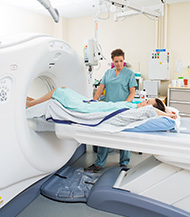Clinical Trial Helps Avoid Unnecessary Surgery
Head and neck cancer (HNC) and its treatment has devastating effects on patients’ self-image, speech and swallowing. After chemoradiotherapy, remaining cancer cells can be difficult to identify, meaning that patients often have to undergo go a three-hour neck dissection surgery.
Neck dissection surgery can have significant complications and after-effects, such as shoulder movement disability, disfigurement of the mouth and neck, and long-term pain. The surgery means up to a week in hospital and has considerable morbidity.
The PET-NECK clinical trial has shown that using positron emission tomography-computed tomography (PET-CT) scans for image-guided surveillance means that these routine operations were no longer necessary, and can now be better targeted for the 20% of patients who still have persistent cancer.
The study was conducted across 37 centres in the UK, co-ordinated by Warwick Clinical Trials Unit and sponsored by University Hospitals Coventry and Warwickshire. 564 patients were recruited between 2007 and 2012, with 282 in the image-guided surveillance group and 282 in the neck dissection control group.
Only 54 (19%) in the image-guided surveillance group went on to undergo neck dissection surgery, compared with 221 (78%) in the control group. Survival rates, quality of life and other factors were considered and remained similar across both groups.
Professor Janet Dunn, from Warwick Clinical Trials Unit said: “This is an important study for the future management of these patients. When we first designed the study in 2007, patients were undergoing routine neck dissection and they did not have access to PET-CT. The results show that the use of PET-CT imaging can prevent unnecessary operations and reduce associated surgical complications.”
As well as the improvement to patient outcomes and avoiding unnecessary surgeries, the PET-CT guided surveillance saved £1,492 per person for the NHS. With around 2,000 patients in the UK each year and up to 100,000 cases world-wide, there’s a significant saving, freeing up funding for other therapies.

WMS PI: Janet Dunn
